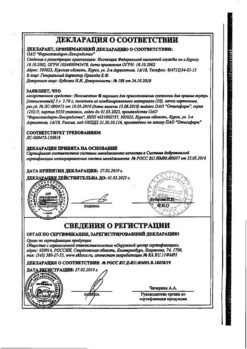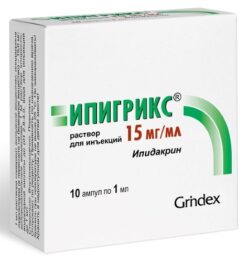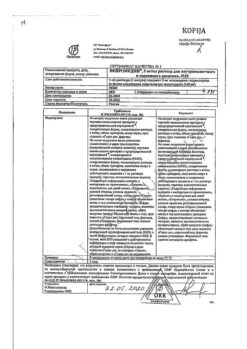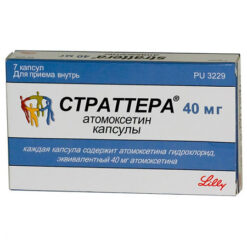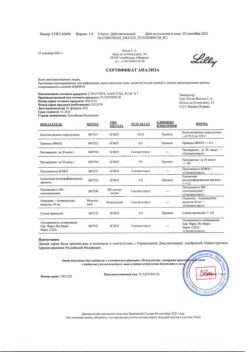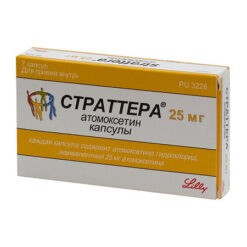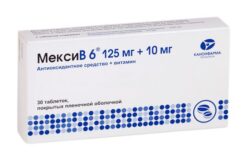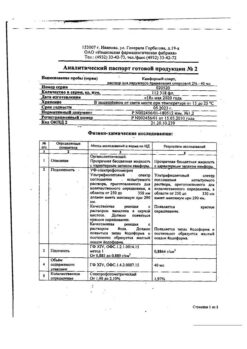No products in the cart.
Esperal, tablets 500 mg 20 pcs
€53.86 €44.89
EAN: 3582910005346
SKU: 103397
Categories: Medicine, Neurology and Psychiatry, Sedatives and hypnotics
Description
The action of disulfiram is based on the blockade of acetaldehydrogenase, which is involved in the metabolism of ethyl alcohol.
This leads to an increase in the concentration of the metabolite of ethyl alcohol – acetaldehyde, which causes negative feelings (rushes of blood to the face, nausea, vomiting, tachycardia, decreased blood pressure, etc.), which make it extremely unpleasant to drink alcohol after taking the drug.
This leads to a conditioned reflex aversion to the taste and smell of alcoholic beverages.
The maximum therapeutic effect is reached 12 hours after oral administration and may continue for 10-14 days after stopping treatment.
Indications
Indications
Prevention and treatment of relapses of chronic alcoholism.
Additionally, the drug is used as a detoxification agent for chronic nickel poisoning.
Pharmacological effect
Pharmacological effect
The action of disulfiram is based on the blockade of acetaldehydrogenase, which is involved in the metabolism of ethyl alcohol.
This leads to an increase in the concentration of ethyl alcohol metabolite – acetaldehyde, which causes negative sensations (flushing, nausea, vomiting, tachycardia, decreased blood pressure, etc.), which make drinking alcohol extremely unpleasant after taking the drug.
This leads to a conditioned reflex aversion to the taste and smell of alcoholic beverages.
The maximum therapeutic effect is achieved 12 hours after oral administration and can last for 10-14 days after cessation of treatment.
Special instructions
Special instructions
In case of simultaneous administration with warfarin or other oral anticoagulants, it is necessary to monitor prothrombin levels more frequently and adjust the doses of anticoagulants, which is associated with an increased risk of bleeding.
Active ingredient
Active ingredient
Disulfiram
Composition
Composition
1 tablet contains:
disulfiram – 0.5 g.
Excipients:
polyvidon K 30,
carmellose sodium,
magnesium stearate,
microcrystalline cellulose,
purified water.
Pregnancy
Pregnancy
Contraindicated for use during pregnancy and breastfeeding.
Contraindications
Contraindications
– Severe liver failure.
– Diabetes mellitus.
– Epilepsy and convulsive syndrome of any origin.
– Mental illness.
– Pregnancy.
– Lactation period.
– Increased individual sensitivity to the drug.
With caution:
– Kidney failure.
– Hypothyroidism.
Side Effects
Side Effects
Side effects due to disulfiram:
– metallic taste in the mouth;
– unpleasant odor (caused by carbon disulfide) in patients with a functioning colostomy;
– rarely – hepatitis (noted both in patients with chronic alcoholism and in some patients treated for eczema for nickel);
– polyneuritis of the lower extremities;
– neuropsychiatric disorders, memory loss, disorientation in time and space, asthenia;
– headache;
– skin allergic reactions;
Side effects due to the disulfiram-ethanol association:
– collapse, heart rhythm disturbances, angina attacks, myocardial infarction;
– cerebral edema, cerebral hemorrhage.
Interaction
Interaction
Contraindicated combinations:
Alcohol: intolerance reaction (flushes, erythema, vomiting, tachycardia). You should avoid drinking alcoholic beverages and medications containing alcohol. Undesirable combinations.
Isoniazid: behavioral and coordination disorders.
Nitro-5-imidazoles (metronidazole, ornidazole, secnidazole, tinidazole): delirium, confusion.
Phenytoin: a significant and rapid increase in the concentration of phenytoin in the blood plasma with toxic symptoms (suppression of its metabolism).
If the combination cannot be avoided, clinical observation and monitoring of drug plasma concentrations should be carried out during and after treatment with disulfiram.
Combinations requiring caution:
Warfarin (and other oral anticoagulants): increased effect of oral anticoagulants and risk of bleeding (decreased metabolism of warfarin in the liver). More frequent monitoring of prothrombin levels in the blood and adjustment of the dose of anticoagulants is recommended for 8 days after discontinuation of disulfiram.
Theophylline: Disulfiram inhibits the metabolism of theophylline. As a result of this, the dose of theophylline should be adjusted (reduced dosage), depending on clinical symptoms and plasma concentrations of the drug.
Benzodiazepines: Disulfiram may enhance the sedative effects of benzodiazepines by inhibiting their oxidative metabolism (especially chlordiazepoxide and diazepam). The dosage of benzodiazepine should be adjusted according to clinical manifestations.
Tricyclic antidepressants: increased alcohol intolerance reaction (if patients receiving disulfiram take alcoholic beverages).
Overdose
Overdose
The combination of disulfiram – ethanol causes depression of consciousness, up to coma, cardiovascular collapse, and neurological complications.
Treatment is symptomatic.
Storage conditions
Storage conditions
At a temperature not exceeding 30 °C (do not freeze)
Shelf life
Shelf life
3 years
Manufacturer
Manufacturer
Sofarimex Industria Kimica e Pharmasuetica S.A., Portugal
Additional information
| Shelf life | 3 years |
|---|---|
| Conditions of storage | At a temperature not exceeding 30 °C (do not freeze) |
| Manufacturer | Sofarimex Industria Quimica e Pharmasuetica S.A., Portugal |
| Medication form | pills |
| Brand | Sofarimex Industria Quimica e Pharmasuetica S.A. |
Related products
Buy Esperal, tablets 500 mg 20 pcs with delivery to USA, UK, Europe and over 120 other countries.



